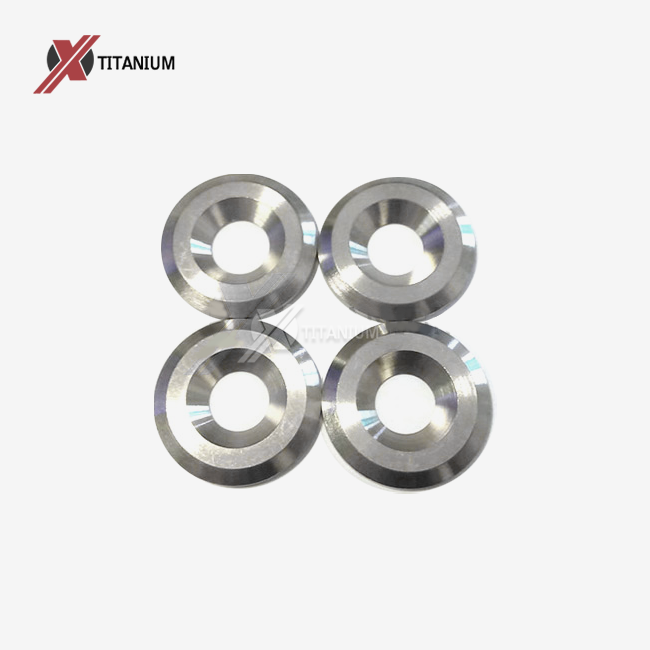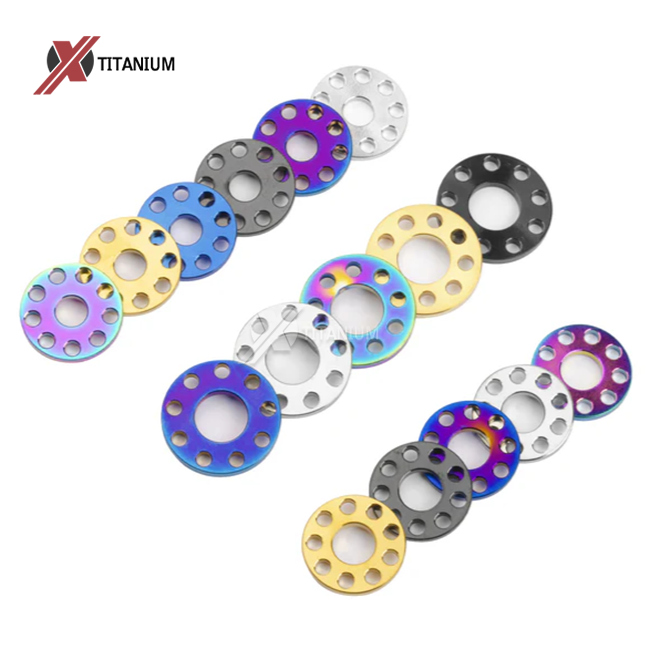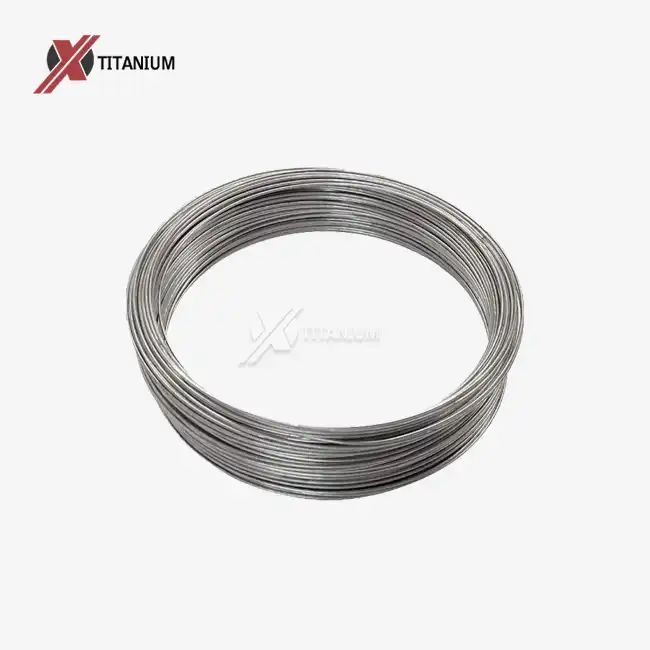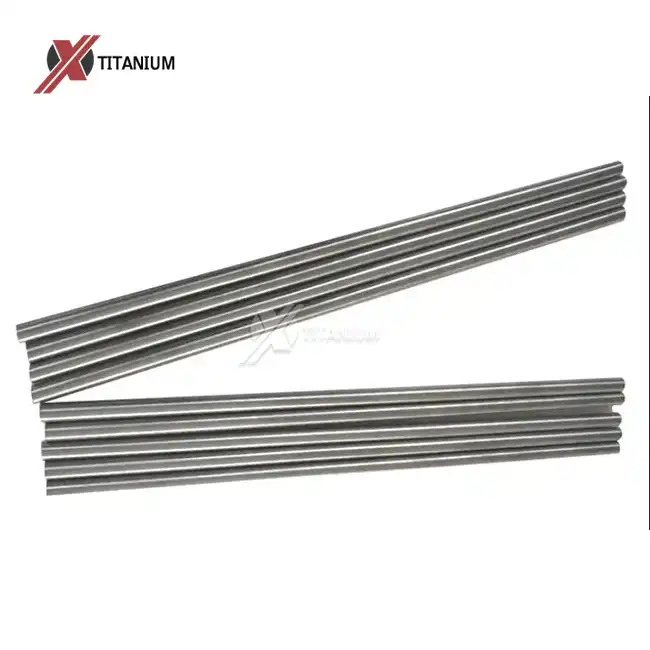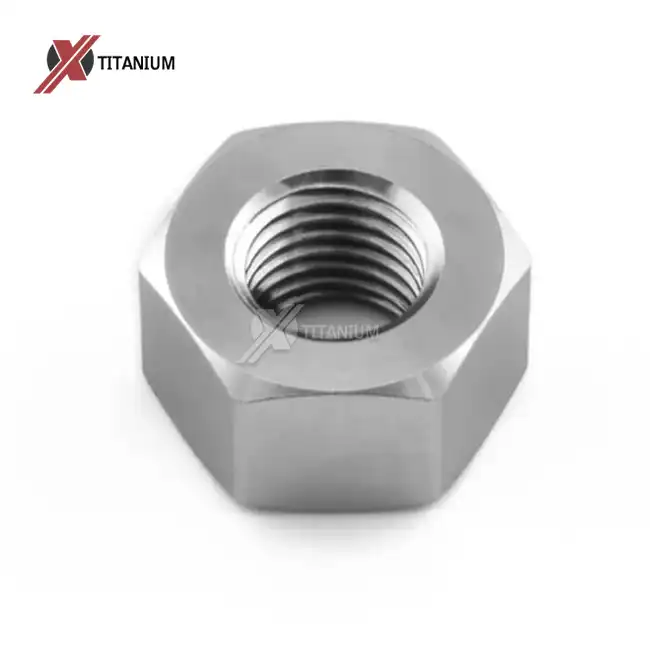Understanding Titanium Countersunk Washers: Properties and Advantages
Composition and Characteristics of Titanium Countersunk Washers
Titanium countersunk washers are meticulously crafted from high-grade titanium alloys, most commonly Ti-6Al-4V (Grade 5). This alloy combines titanium with 6% aluminum and 4% vanadium, resulting in a material that boasts an impressive array of properties. The countersunk design features a tapered edge that allows the washer to sit flush with the surface when paired with a countersunk screw or bolt.
These washers exhibit remarkable tensile strength, typically ranging from 895 MPa to 1000 MPa, depending on the specific grade and heat treatment. Their yield strength, often exceeding 828 MPa, ensures they maintain their shape under significant stress. Despite this strength, titanium countersunk washers are surprisingly lightweight, with a density of approximately 4.43 g/cm³ – nearly half that of steel.
One of the most lauded characteristics of titanium countersunk washers is their exceptional corrosion resistance. They form a protective oxide layer when exposed to air, making them highly resistant to various corrosive environments, including saltwater, acids, and industrial chemicals. This property significantly extends their lifespan and reduces maintenance requirements in harsh operating conditions.
Advantages of Using Titanium Countersunk Washers
The use of titanium countersunk washers offers a multitude of advantages across various applications. Their high strength-to-weight ratio is perhaps the most significant benefit, allowing for substantial weight reduction without compromising structural integrity. This property is particularly valuable in aerospace and automotive industries, where every gram saved can translate to improved fuel efficiency and performance.
The biocompatibility of titanium is another crucial advantage, especially in medical applications. Titanium countersunk washers used in surgical implants or prosthetics are well-tolerated by the human body, reducing the risk of rejection or allergic reactions. This characteristic, combined with their corrosion resistance, makes them ideal for long-term implantation.
Thermal stability is another noteworthy attribute of titanium countersunk washers. They maintain their mechanical properties across a wide temperature range, from cryogenic conditions to elevated temperatures exceeding 400°C. This thermal resilience makes them suitable for applications involving extreme temperature fluctuations.
Furthermore, the natural oxide layer formed on titanium surfaces provides excellent resistance to galling and seizing. This property ensures that titanium countersunk washers remain easy to remove even after prolonged periods in challenging environments, simplifying maintenance and replacement procedures.
Applications of Titanium Countersunk Washers in Various Industries
Aerospace and Aviation
In the aerospace industry, titanium countersunk washers play a pivotal role in aircraft construction and maintenance. They are extensively used in the assembly of fuselage panels, wing structures, and engine components. The countersunk design allows for a smooth, aerodynamic surface, crucial for reducing drag and improving fuel efficiency.
Satellite manufacturers also leverage the benefits of titanium countersunk washers. In space applications, where every gram matters, these lightweight yet strong components contribute to reducing payload weight without compromising structural integrity. Their resistance to extreme temperature fluctuations in the space environment further solidifies their importance in this field.
Military aviation, particularly in the construction of fighter jets and high-performance aircraft, relies heavily on titanium countersunk washers. These washers help maintain the structural integrity of the aircraft under high-stress conditions, including supersonic speeds and aggressive maneuvers.
Automotive and Racing
The automotive industry, especially in high-performance and racing sectors, has embraced titanium countersunk washers for their exceptional properties. In Formula 1 and other motorsports, these washers are used in critical areas such as suspension components, brake systems, and engine assemblies. Their lightweight nature contributes to overall weight reduction, a crucial factor in racing performance.
Luxury and sports car manufacturers also incorporate titanium countersunk washers in their designs. These components find applications in areas requiring high strength and corrosion resistance, such as exhaust systems, chassis components, and engine mounts. The use of titanium washers not only enhances performance but also adds to the premium feel and longevity of high-end vehicles.
In the realm of electric vehicles, where weight reduction is paramount for extending range, titanium countersunk washers are gaining traction. They are used in battery pack assemblies, motor mounts, and structural components, contributing to the overall efficiency and performance of these cutting-edge vehicles.
Marine and Offshore Applications
The marine industry benefits greatly from the corrosion-resistant properties of titanium countersunk washers. In shipbuilding, these washers are used in areas exposed to saltwater, such as hull fittings, propeller assemblies, and deck hardware. Their resistance to marine corrosion significantly extends the lifespan of these components, reducing maintenance costs and downtime.
Offshore oil and gas platforms utilize titanium countersunk washers in critical structural joints and equipment assemblies. The harsh, corrosive environment of offshore operations demands materials that can withstand constant exposure to saltwater and chemical contaminants. Titanium washers meet these demanding requirements, ensuring long-term reliability and safety.
Underwater robotics and exploration equipment also rely on titanium countersunk washers. In deep-sea applications, where pressure and corrosion resistance are paramount, these washers provide the necessary strength and durability for successful operations in extreme conditions.
Manufacturing Processes and Quality Control for Titanium Countersunk Washers
Production Techniques and Precision Engineering
The manufacturing of titanium countersunk washers involves a series of sophisticated processes to ensure precision and quality. The production typically begins with high-grade titanium alloy sheets or bars, which undergo initial cutting and shaping. Computer Numerical Control (CNC) machining is often employed to achieve the precise dimensions and countersunk profile required for these specialized washers.
The countersinking process itself requires meticulous attention to detail. The angle and depth of the countersink must be carefully controlled to ensure proper seating of the screw head and optimal load distribution. Advanced tooling and cutting techniques are used to prevent work hardening of the titanium, which can occur due to its high strength and low thermal conductivity.
Heat treatment processes may be applied to enhance the mechanical properties of the titanium washers. Solution treating and aging can significantly improve strength and hardness while maintaining the material's ductility. These heat treatments are carefully controlled to achieve the desired balance of properties without compromising the dimensional accuracy of the washers.
Surface Treatments and Finishing
After machining, titanium countersunk washers often undergo various surface treatments to enhance their performance characteristics. Anodizing is a common process used to increase surface hardness and wear resistance. This electrochemical process creates a protective oxide layer that can also be colored for identification purposes or aesthetic reasons.
In some applications, titanium countersunk washers may receive additional coatings or treatments. For instance, in aerospace applications, dry film lubricants might be applied to reduce friction and prevent galling. In medical implants, specialized biocompatible coatings can be used to promote osseointegration or reduce the risk of infection.
Surface finish is crucial for the performance of titanium countersunk washers. Polishing techniques, including mechanical and electrochemical methods, are employed to achieve the desired surface roughness. A smooth finish not only improves the aesthetic appeal but also enhances fatigue resistance and reduces the risk of stress concentration.
Quality Control and Testing Protocols
Rigorous quality control measures are implemented throughout the manufacturing process of titanium countersunk washers. Dimensional inspections are carried out using high-precision measuring equipment, including coordinate measuring machines (CMMs) and optical comparators. These checks ensure that the washers meet the stringent tolerances required for their intended applications.
Material composition and mechanical properties are verified through various testing methods. X-ray fluorescence (XRF) spectroscopy is often used to confirm the alloy composition, while tensile testing and hardness measurements validate the mechanical characteristics. In critical applications, non-destructive testing techniques such as ultrasonic inspection or dye penetrant testing may be employed to detect any internal flaws or surface imperfections.
For applications in aerospace or medical fields, additional certifications and traceability requirements may be necessary. This often involves detailed documentation of the manufacturing process, material sourcing, and test results for each batch of titanium countersunk washers produced.
Conclusion
Titanium countersunk washers represent a pinnacle of engineering in fastener technology. Their unique combination of strength, lightweight properties, and corrosion resistance makes them indispensable in a wide range of high-performance applications. From aerospace to medical implants, these specialized components continue to push the boundaries of what's possible in modern engineering and manufacturing.
As industries evolve and demand ever-higher performance standards, the role of titanium countersunk washers is likely to grow, driven by ongoing innovations in materials science and manufacturing techniques. For more information about titanium products and their applications, please contact us at info@cltifastener.com or djy6580@aliyun.com.
